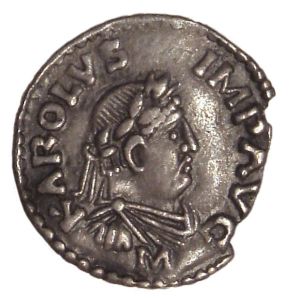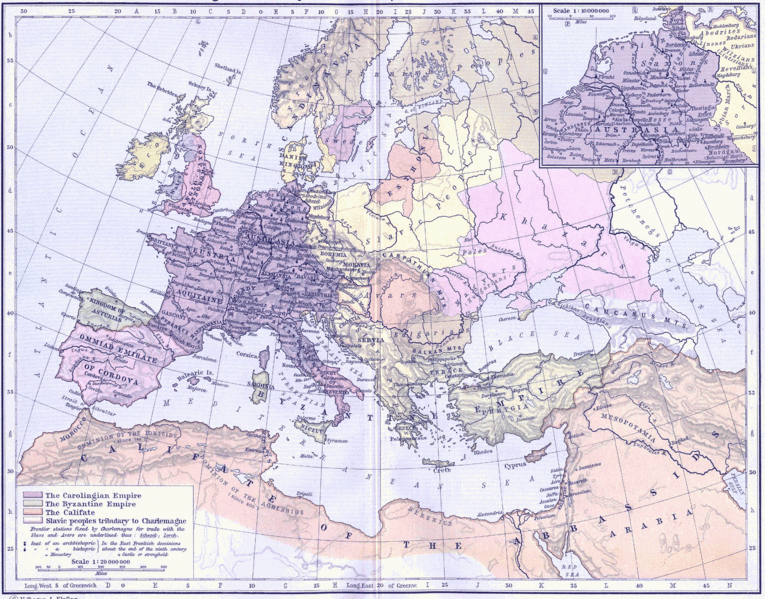Everyone involved in the celebration of Christmas is familiar with the dangers of inflated expectations. Whether its that suspiciously large box sitting under the tree, or the oversized turkey in the kitchen waiting ominously to be stuffed, the season abounds with possibilities for surprise, joy, and of course, disappointment.
In the whole history of Christmas gift-giving, however, I doubt if their has ever been a more lavish (or ostensibly surprising) gift than that given by Pope Leo III to Charlemagne on Christmas Day in the year 800 C.E. On this day, one of the grandest feast days of the Christian calendar, Charlemagne was granted the imperial crown of Rome and the title of Emperor.

A denier of Charlemagne, depicting him in the flowing cloth and laurel crown of a Roman Emperor. Early 9th c. (Wikimedia)
It may seem like a rather extravagant gift, but Pontiff Leo had good cause to be generous. Charlemagne, as King of the Franks, had throughout his forty-seven year reign conquered much of Europe’s ‘barbarian fringe,’ including the Saxons, Danes, Slavs, Alemanni, and Bretons. These accomplishments brought a vast and diverse territory under his authority, earning him the title The Father of Europe from modern historians, and making him a powerful political ally to contemporaries.
The Popes–little more than ‘Bishops of Rome’ at this time, competing for pre-eminence with the patriarchs of Alexandria, Jerusalem, Antioch, and Constantinople–had turned to Charlemagne repeatedly since the 770s, using his power to quash their localised enemies in Italy. In 773, for example, Charlemagne had rescued Pope Adrian from a Lombard siege (while also enlarging his own substantial landholdings). Thus, when Adrian’s successor Leo was confronted by an angry Roman mob (upset over his succession) who threatened to gouge out his eyes, Charlemagne was a natural ally.
Einhard, Charlemagne’s contemporary biographer, credited his king’s willingness to aid the Pope to his great piety.
‘He cherished the Church of of St Peter the Apostle at Rome above all other holy and sacred places, he wrote, and heaped its treasury with a vast wealth of gold, silver, and precious stones. He sent great and countless gifts to the popes; and throughout his whole reign the wish that he had nearest at heart was to re-establish the ancient authority of the city of Rome under his care and by his influence, and to defend and protect the Church of St Peter….’
We might suspect the true innocence of his motives, however. His first intervention on behalf of the papacy had won him not only lands at the expense of the Lombards in Italy, but also the Roman title of patrician. Aiding them a second time not only cemented his power on the peninsula, but also brought him closer in status to the Byzantine imperial office, with whom he competed for control of affairs in Italy.

A political map of Europe ca. 800 C.E. At this time, the Franks and the Byzantines were the main claimants of Rome’s imperial legacy. (Wikimedia)
Given these political motives and Charlemagne’s instincts as a senior statesman, its hard to believe, as Einhard insists, that ‘he would not have set foot in the Church that day…if he could have foreseen the design of the Pope‘ to crown him Emperor. Whatever Charlemagne’s true level of foreknowledge, however, there was one party to the whole affair that was not only surprised, but unpleasantly so.
The Byzantines, who for nearly 300 years had presented themselves as the only true and legitimate heirs to the imperial legacy of Rome, very certainly did not want another Emperor in Europe. For them, December, 800 must have been a very difficult Christmas indeed.
Learn More:
Einhard’s The Life of Charlemagne is available in open source translation on the Internet Mediaeval Sourcebook.

“Merry Christmas, Charlemagne. I got you Rome, I hope you like it.”
Who would say no?
Timothy Reuter wrote more or less that in the closing part of his book Germany in the Early Middle Ages: to paraphrase, becoming emperor brought the kings of the Franks and then of the Germans little but trouble and involved them in tremendous efforts, it’s hard to understand why they bothered except that it’s more or less impossible to imagine any medieval king turning the honour down…
For a similar reason, I do wonder sometimes whether Einhard’s story about Charlemagne not knowing what Leo was planning is more plausible than we usually allow. Leo desperately needed Charlemagne’s support, after all Charlemagne’s rescue attempt was followed by his putting Leo on trial to answer charges against him! It’s not quite the endorsement the unpopular pope might have wished. But if Leo could make himself directly responsible for a status upgrade to which Charlemagne could hardly have said no… and, indeed, if he hadn’t known, his actions would presumably have had to be more or less the same. It would have been the ultimate piece of political flattery and a gift that demanded a return even if what turned out to be in the wrapping was Pandora’s Box…